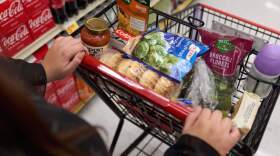The federal government will stop payments to Supplemental Nutrition Assistance Program recipients this weekend if the shutdown continues, and states are stepping in to figure out how to keep people from going hungry. Food bank volunteers are mobilizing to help, and many were already anticipating more need, because of cuts to SNAP that congress passed earlier this year.
Eight volunteers load squash into boxes and put the produce on trucks, at the Northside Presbyterian Church in Blacksburg. Frost hit earlier than they’d expected, so they had to harvest the last of their crops quickly. Hundreds of pounds of winter squash are heading to food banks this week, right at a pivotal time, said Charlie Herbert.
“It’s just such a need out there right now,” Herbert said. “People are hungry, and they were hungry before the SNAP benefits were cut. And now that they’re cut, it’s gonna get even worse.”
Herbert runs another community garden in Giles County and is delivering this squash to pantries in his community. The rest is going to pantries in Montgomery County.
This squash was grown by John Galbraith and his wife Marilyn. With the help of volunteers, they grow hundreds of thousands of pounds of produce at seven gardens across Blacksburg and donate it. In the past year, he said, more people have been seeking food at pantries.
“The need is bigger than they can ever recall,” Galbraith said. “The food that we would grow used to last until the second week in December, and now we’re out, generally before Thanksgiving.”
For his day job, Galbraith is a professor at Virginia Tech, and he runs this nonprofit, called the Glean Team as a hobby.
Most of the squash they harvested is butternut, and there are other types of green and orange colored winter squash. To cook them, Galbraith recommends cutting the squash in half, remove the seeds, and bake it with a little water at 375 degrees.
“And then add spices, you know, whatever you want,” Galbraith said. “If it’s a butternut, you don’t have to add anything. If it’s been heated once, or cooled, then add a little butter, and you’re good to go.”

In the nearby community of Elliston, Marie Goodwin and her neighbors launched a new community garden last year.
“Elliston and Shawsville are in a food desert area,” Goodwin said. “The nearest grocery store is 10 miles away. So everybody is very grateful to have fresh produce.”
Their garden donates produce to a free fridge in the Meadowview library and a pantry called Dale’s Place. There, volunteer Joyce Kelley said they’re anticipating more people will need food and have already heard from concerned clients.
“Yes they are worried. I had two calls yesterday asking if we would be open because of the shutdown of the government,” Kelley said. “We had enough food in the pantry to supply the people who came.”
People who receive food aid from SNAP won’t have money from the federal government during the shutdown, according to the U.S. Department of Agriculture. In response, Governor Glenn Youngkin has launched a new, temporary state program, so SNAP recipients can keep receiving food benefits, at least through November. Youngkin is also sending a million dollars to food banks.
Kelly said Dale’s Place will keep giving out food, whatever happens. “I’m so happy to get up and go over there to have a distribution on a Tuesday morning,” Kelley said. “But at 93 years old, I am kind of slowing down, and I can’t do the things I used to do, although I would love to.”
She is getting a few additional helpers to run the pantry, but said she plans to keep showing up, partly because of the social connections she makes there. She lost her husband and children several years ago and only has three grandchildren who live out of state.
“I don’t see them very often. I see the people at the food pantry and they have become really my family,” Kelley said. “I love the people that come through. And they know I love them. So I will be there as long as I can.”
Volunteers like Kelly can’t solve all the problems caused by the cuts to SNAP and rising food costs. But she hopes those in need feel comfortable asking for help and enough food is available to give them.
Feeding Southwest Virginia has a support hotline to find food resources in Southwest Virginia 540-299-0004.
To learn what resources are available across Virginia, contact the regional food banks in your area:
- Central Virginia: Feed More
- Blue Ridge/ Shenandoah Valley: Blue Ridge Area Food Bank
- Other food banks in eastern and northern Virginia can be located through the Virginia Federation of Food Banks





